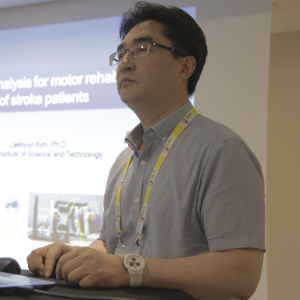Title : EEG data analysis for motor rehabilitation of stroke patients
Abstract:
Stroke is the leading cause of adult neurological disabilities in most countries and typically damages particular regions of a patient’s brain and results in functional impairments. The process underlying the recovery of impaired motor functions after stroke involves brain plasticity, in which motor rehabilitation therapy stimulates new neural connections and enhances cortical reorganization in order to recover normal motor function. Thus, EEG data from storke patients can reflect the brain damage and recovery during the rehabilitation. We have studied EEG data analysis for motor rehabilitation of stroke patients. Firstly, we proposed a novel method for monitoring cognitive engagement in stroke patients during motor rehabilitation. Active engagement reflects implicit motivation and can enhance motor recovery. Secondly, we found that brain activation differs according to lesion location. The hemispheric asymmetry and topographic characteristics of the beta band power patterns in the patients with stroke differed according to the location of the lesion, which suggested that EEG analyses of neurorehabilitation should be implemented according to lesion location. Finally, If an early predictor of motor functional outcome after stroke were available, stroke patients would receive more appropriate treatments for motor recovery. We performed a correlation analysis of the electroencephalography (EEG) signal patterns of nine subacute stroke patients and their motor recovery rates. In this study, EEG patterns in motor areas correlate with motor recovery after stroke and can be used as an early predictor of motor functional outcome.




